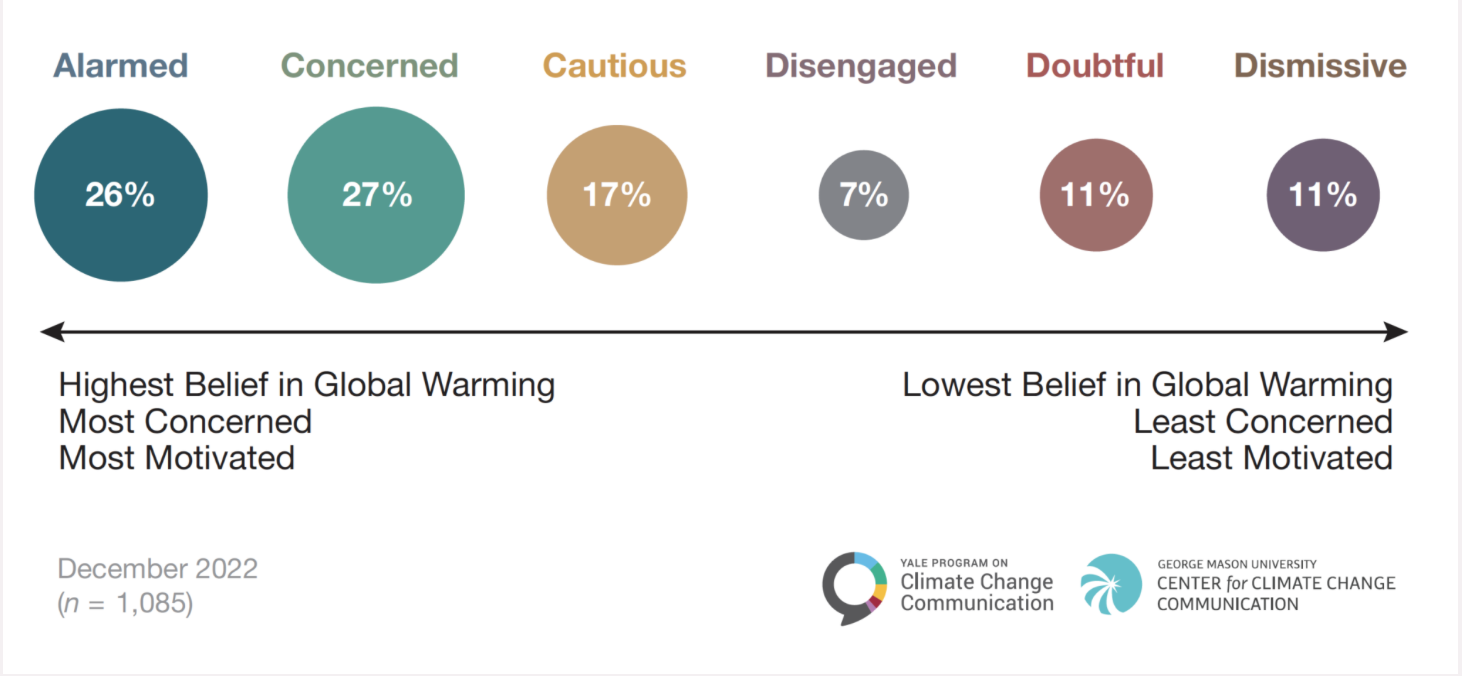The missing quiet climate conversations

Much of the talk around climate is preaching to the choir. That’s not necessarily a bad thing; the choir sometimes needs encouragement, and we all need to hear an “amen” now and then. Some of the talk around climate is attacking the devil. That’s not necessarily bad either: those who dishonestly undermine climate progress, those who know better but fight against climate change progress because of their own hunger for profits or power, those who raise “insincere objections”, need to be called out. You won’t convince them, but you can try to deny them unchallenged airtime.
There’s a third kind of climate talk that doesn’t happen often enough. That’s the quiet conversations, sitting down and talking with people who are smart and well-intentioned but have doubts about climate change and the urgency and likelihood of drastic action to slow and prepare for its impacts.
This is especially important because, even though the proportion of Americans who are “Alarmed” about climate change has more than doubled in a decade, nearly two-thirds of the US is still between the two extremes on climate. Yale’s Program on Climate Change Communication has studied this for over a decade. According to their latest survey, Americans break out into 6 “climate audiences” this way:
· 26% of us are “Alarmed” about climate change
· 11% of us are “Dismissive” of climate change concerns
· 62% fall in the middle – “Concerned, Cautious, Disengaged or Doubtful”

I’m guessing that the breakout in your company (or with your friends and neighbors) is similar, though depending on geography and industry it could skew very differently. (Yale’s Center even has a handy tool if you want to survey your people and see what the breakout is.) If you’re just preaching to those who are already Alarmed and berating those who are still Dismissive, you could be missing nearly two-thirds of your audience.
“I’m not convinced”
I recently had a quiet conversation with someone who is very much in that middle. He’s a very smart guy whose participation is crucial to his company’s achievement of its climate agenda. We were together in a workshop that included discussions of the ESG wars and mixed investor signals on both substantive climate issues and the “ESG” label.
We caught up one-to-one after the workshop. He started the conversation by volunteering that he is not convinced about climate change, especially as “many scientists don’t agree on it.”
What was I supposed to do? Shove the IPCC report down his throat?
What we did was we had a quiet conversation. I heard him out and listened to his views. I honestly shared my views, I didn’t pull any punches or soften my beliefs. I didn’t ask if he agreed. We commiserated on the challenges of managing uncertainty. We talked about how all that could affect his company, including how it might play out with regulators and investors.
A few days later, I got an unsolicited email from him: "Enjoyed catching up with you and always enjoy a spirited discussion! I’m looking forward to moving [my company’s] ESG initiatives forward together."
Talking with, not to or at
I wrote earlier: “I recently had a quiet conversation with someone who is very much in that middle.” The operative word is "with" - not to or at (or around – I have not shared this conversation with his boss or the sustainability lead of their company).
Our conversation followed a clear constructive path:
- Ask. What does the other person believe, what do they think is going to happen, with both the physical climate and political climate.
- Listen. Really listen to their answers. Try to understand what they have heard, what sources they trust. Don’t just scan for hooks for your clever responses.
- Share. Be open about your position. Be honest and be vulnerable.
- Explore. Share what you're doing and why – not because that’s what anyone else should do, but to be open and get feedback. Talk about how this might affect the business of the business, in the competition for customers, investors and talent. Keep your tone reasonable, not panic-stricken, no matter how dour your words and forecast may be. Discuss physical risk and adaptation (which is much more immediate and tangible), not just mitigation.
There are some clear lessons and techniques for having these quiet conversations:
- Data doesn't change minds. If we have a deeply held mental model, and we get data that conflicts with that model, we usually reject the data rather than changing our mental models.
- Ask and listen, don't teach and preach, don’t tell and sell. What DO people understand and believe? Do they question the science or just assume that technology will save us?
- Do connect climate to business outcomes and value. These are quiet business conversations, not abstract policy colloquia.
- Don't pretend to have certainty. I don't have certainty. IPCC doesn't have certainty. They have overwhelming evidence to support their calculations of probability, but no one can be certain of something that has never happened before. Just compare the probabilities of climate change to, say, probabilities of a plane crashing. I guarantee you would not put your family on that plane!
- Don’t ask for a loyalty oath or certificate of surrender. See where the discussion goes. Don't come in with a pre-determined outcome. Assume the conversation is on-going and will probably be iterative.
We need to spend a lot less time preaching to the choir, let alone to our fellow “clergy.” We need to be talking with the people who aren't even in church, no matter how uncomfortable those conversations may be.



Member discussion